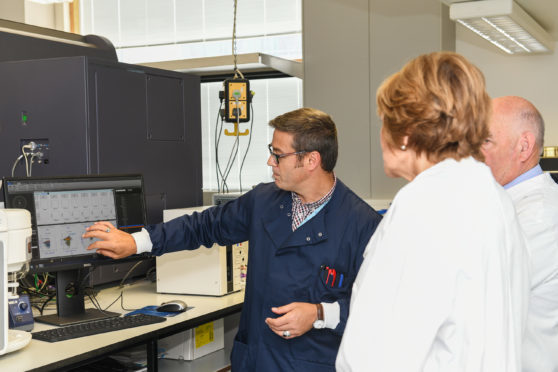Work to make Aberdeen a world-class cancer research centre has been given a boost with the unveiling of a machine which can scan 30,000 blood cells per second.
The £85,000 Attune Acoustic Focusing Cytometer will allow scientists to detect cancer at speeds far greater than they were able to before.
It can also be used during pre-diagnosis of early stage cancer, where someone develops a disease or syndrome which can develop into cancer.
The cutting-edge piece of technology has been donated to Aberdeen University by The Gordon and Ena Baxter Foundation.
It awards grants from the personal legacies of the Speyside couple who ran the globally-renowned Baxters company for more than 50 years.
Professor Steve Heys, head of the Aberdeen University school of medicine, medical sciences and nutrition, said: “Cancer cells are extremely difficult to find but with this new technology the process will be faster and more efficient, allowing us to scan for a wider range of cell types within a huge mixed population.”
The university is in the midst of a £4.5million fundraising drive to make Aberdeen one of the best places for cancer research in the world.
It is hoped that the money will be able to attract academics from across the globe to bolster the research already being undertaken in the city.
Last year charity Friends of Anchor successfully raised £1million towards the project through a range of initiatives which included deploying a series of giant anchor statues across the region before auctioning them off.
Dr Raif Yuecel, head of the university’s Iain Fraser Cytometry Centre said: “The generous support from the Gordon and Ena Baxter Foundation in providing this cutting-edge technology has enabled Iain Fraser Cytometry Centre at IMS to be at the forefront of cancer research.”
Kay Jackson, manager of The Gordon and Ena Baxter Foundation, said: “The development of new and more effective treatments requires a deeper understanding of cancer cells and this incredible machine will enable the team to closely examine specific types with much greater efficiency.
“They are striving to understand more about the disease in order to beat it and we are delighted and honoured to be able to play a part.”
